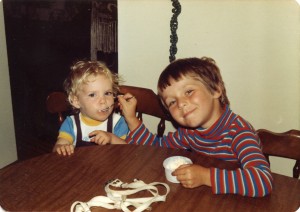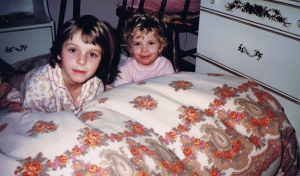By: Sheryl Hatton
I must admit, I was pretty excited when I sat down to write this piece; reflecting on my experiences as a typically hearing sibling of a child with hearing loss brought back lots of fond memories. I should clarify, however, that with just the one sibling, having a sister with hearing loss was my normal, and I don’t have personal experience of having a sibling without a hearing loss. I had never been a big sister before, so that was a new adventure in itself. Just like any older sibling, I remember having to learn to share everything: my toys (when she stole them), my clothes (when she stole them), my friends, and my parents! Having a hard of hearing sister meant that I also got to experience other things that many kids don’t. It’s a lot of fun to look back on this now as an adult, and I’m happy to share some of these memories with you.

We learned of my sisters hearing loss when she was two years old. At this point, I had just started school, and was old enough to understand what was happening with her. Some of my earliest memories are from my sister’s audiologist and ENT appointments; I have very vivid memories of a tiny toy monkey “jumping out” from a box and banging miniature cymbals!

My sister’s hearing loss was identified as moderate to moderately-severe sensorineural hearing loss for both ears. Once she was fitted with hearing aids, her language developed very quickly. I remember watching my mom work tirelessly to teach my sister letter and word sounds; “tum”, ‘bum” and “thumb” were a particular challenge and frequently mixed up early on…at times to my enjoyment. I don’t recall thinking this was strange or different than what my friends would see in their homes. Although I knew that she went to a specialized pre-school to help her in her speech and hearing development, I never really thought anything of it.
I do remember being intrigued with all the cool things that my sister got to do, and that I wanted to experience them for myself. Rituals with us laying in bed with hydrogen peroxide tickling our ears as it bubbled was a particular highlight. (Warning: do not try this at home without the advice of your doctor!). In retrospect, I learned from this that too much earwax can be a problem for a child who wears hearing aids but at the time, it was just a lot of fun for me. I very much wanted to be involved, and took great enjoyment in helping our mom test hearing aid batteries and the hearing aids themselves with a stethoscope. This skill came in useful when my sister entered grade school; I was given the task at school of testing her “phonic ear” (FM system) each morning until she was old enough to do it herself. I took great pride in that role.
At home, I figured out, much to our parents’ frustration, that jumping up and down on the floor on one side of the house was a great way to get my sisters attention when she was on the other side. I also learned to enunciate my words, speak loudly, face her when I was speaking, and use my hands to enhance my speech. These were not things that were taught to me explicitly, just ways that we naturally adapted. As an adult, and a teacher, I am very grateful for these early lessons in communication strategy.
I also realized that having someone who can lip-read in your life is both a blessing and a curse; it’s great if you want someone to help you spy, but not so great if you are trying to have a private conversation with someone else! Although I never would have admitted it to my parents at the time, I often tormented my sister by mouthing insults at her (so my parents wouldn’t hear it), just to get her riled up. Despite my role in her torture, I was intensely protective of my sister at the same time, and would never have let anyone else get away with similar actions.
My sister had her share of annoying quirks too, and she certainly knew how to use her hearing aids to her advantage. When she didn’t like what someone was saying, she found her own means of tuning them out. What began as a toddler telling us “no-talka-me” and turning off her hearing aids, evolved into a chant of “I don’t have to listen to this….I don’t have to listen to this…” followed by the familiar click of hearing aids being switched off. As a teenager, she would use the excuse of “oh, my hearing aids weren’t in, I didn’t know you were waiting” to ensure she got more time in the washroom than me before school each morning. I, in turn, learned how to pick a lock!
As we grew up, I saw my sister develop many friendships, play sports, camp, swim, and excel at a mainstream school; all things one would expect from a child with typical hearing. As a teen, though, I was aware of my sister’s insecurities around people seeing her hearing aids, and I would see her struggle in situations with a great deal of background noise. Like anyone of that age group, she didn’t want to be different. I never truly understood those challenges, most likely because for me she was just like everyone else.
In all, as a sibling of a child with hearing loss, I can honestly say I wouldn’t change a thing. Our lives were pretty normal. Our childhood was fun and rich. My experiences have helped me to be a more aware and empathetic person, and inspired ongoing curiosity to learn about unique learning strengths and needs. In many ways, her “impairment” has been a gift in helping shape who I am today.

